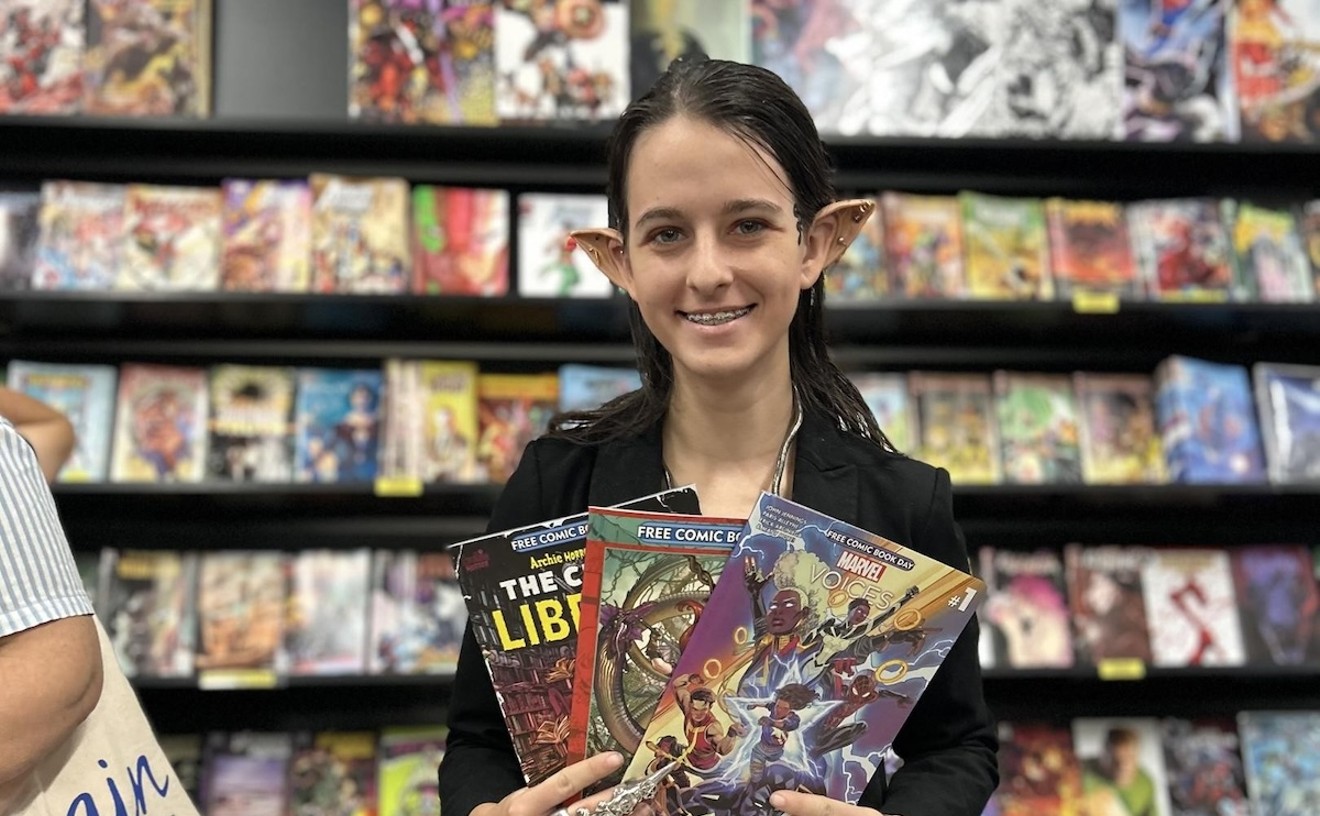For a gay elf at Christmastime, falling in love with your boss is a fruitless occupational hazard. Santa is straight, and though the beard might be sexy, he's off the market.
In Matt Hoverman's short play The Student, the best piece at City Theatre's inconsistent Summer Shorts festival at the Adrienne Arsht Center, Todd Allen Durkin plays a prim, proper, and pent-up pupil who has penned a story about this exact scenario. In this masterful comedy of homoerotic repression and twisted yuletide metaphor, Durkin's student appears in his teacher's office for a critique of his creative-writing assignment. Ken Clement plays the teacher, a struggling novelist who has just received another rejection letter and is not having the best of days. When Durkin expresses starry admiration for his teacher's profound advice, Clement responds, "I'm not a mentor. I'm a de-mentor."
It soon becomes clear that the elf and Santa's situation closely resembles a certain student-teacher relationship. Director Antonio Amadeo fills his pacing with lengthy beats to draw out the discomfort between the lines, and Durkin fills them with extraordinary comic timing. Clement is equally effective as the frustrated straight man, in more ways than one; everything these two seasoned veterans exchange (and don't exchange) is cripplingly funny. As we'll see, this Summer Shorts is particularly reliant on outrageous costumes and lofty concepts, but The Student is a reminder that with such gifted acting, directing, and writing, minimalism is more than sufficient.
The Student is the highlight of Summer Shorts' 11 plays, five of them world premieres, culled from some 900 entries. The overall package for this annual short-play bonanza is usually rough, but it contains a few diamonds.
The most effective piece in Act II is Nina Mansfield's Bite Me, with Margaret Ledford directing Durkin as a callous corporate lawyer and Vera Varlamov as his dazzling trophy wife, who has planned an unusual surprise for her husband upon his return from work one evening. Without spoiling anything, it suffices to say that Clement joins the couple as a nonchalant vampire, who seems to be more concerned with filing his nails than sucking anyone's blood. This trio is compelling and hilarious, with Ledford grounding the action in deadpan wit when it might have been easier to go over the top.
The program's best drama is Holly Hepp-Galvan's lovely Departure, which employs a supernatural conceit to convey a universal story about parents pressuring children into choices. John Manzelli directs another strong performance from Varlamov, as a shut-in adolescent with a secret; she's all but unrecognizable from her more glamorous parts in some of the other plays. And Feel the Tango is a pleasing if insubstantial comic fantasia, with Clement and Irene Adjan as a bored married couple whose routine is upended when a visit to a Spanish restaurant turns steamy.
The Favor, on the other hand, is a head-scratching selection, with Durkin and Adjan doing the best they can to make sense of Leslie Ayvazian's bizarre scenario about the lead-up to a deathbed smooch. It resides awkwardly between comedy and drama, and excels at neither. Steve Yockey's existential noir story, Serendipity, begins promisingly, with the characters frozen in time on a shadowy urban street, like the subjects of a George Segal sculptural tableau. But it quickly grows long and tiresome, and its payoff is unsatisfying.
Then there's the simply weird, such as Rick Park's Please Report Any Suspicious Activity, about bickering dolphins airing their grievances on a subway train. It's a costume comedy that, once you get past the initial joke of Clement and Rayner Garranchan entering the room in dolphin suits, just isn't funny enough to sustain even the length of a short. Ditto regarding Mothra vs. the Casting Director: An Allegory, Summer Shorts' big closer, which re-brands the vintage Japanese horror monster Mothra (Clement, in his third elaborate costume of the night) as a boozy, disgruntled actor trying to make it in today's Hollywood. The movie-insider jokes will sate cineastes, but the play's esotericism limits its appeal and even hamstrings the other actors.
Manzelli and company selected a stellar cast, especially Durkin, Varlamov, and Clement, while Adjan shines in The Gay Agenda, an otherwise weak Paul Rudnick monologue about a superficially cheerful anti-gay bigot losing her grip on reality. If there's a weak link, it's Garranchan, who plays a young man who throws away his cell phone — and his connection to the world — in Kendra Blevins' mediocre iZombie and a restaurant diner on a first date in Sheri Wilner's surrealist gender study A Tall Order. In both cases, he's a meek presence whose female costars — Varlamov and Renata Eastlick, respectively — can eat him alive, which renders tone-deaf Eastlick's anxiety over which entrée she'll order to please him.
Showcasing as many jalopies as gems, Summer Shorts 2013 once again begs a question that seems to resound annually: Is this crop of shorts really the best of the nearly 1,000 works submitted for consideration? But there's at least one way in which this program is certifiably superior to its predecessors: its staging.
For the first time I can recall, the production team has designed a cohesive set linking the disparate narratives. All of the plays launch from a sleek art gallery, whose walls feature posters and artwork celebrating their various themes, framed from behind by flowing, floor-to-ceiling curtain panels. Transitions between shows are supplemented by "audio tour" voiceovers satirizing pedantic art-gallery verbiage while introducing audiences to the next play. It's a brilliant conceit, and even if not every play lives up to its potential, City Theatre has upped its game, setting a stylistic bar for years to come.










